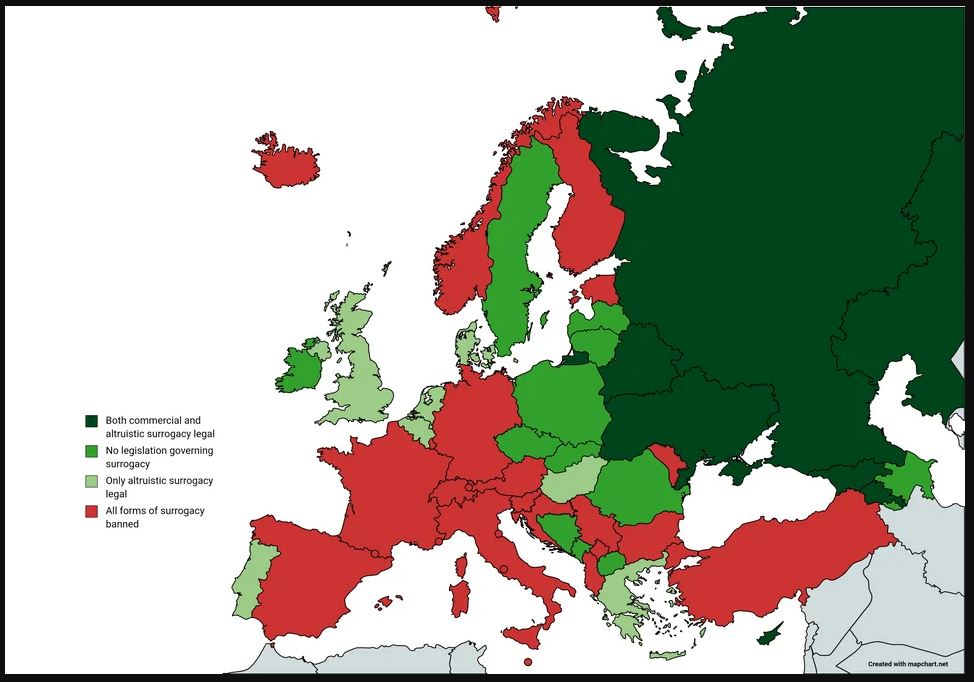We have often heard a lot regarding surrogacy tourism, yet not most of us are aware of this term. In layman’s language, surrogacy tourism, a part of medical tourism, has developed as a noteworthy means of financial empowerment for many nations around the globe.
Talking about the process may include people or couples travelling to another nation to hire a surrogate to carry and give birth to a child for them. That said, it is driven by different variables, including prohibitive surrogacy laws in their nations, the high cost of surrogacy strategies, and the accessibility of surrogates in other countries. Whereas surrogacy tourism raises certain ethical, lawful, and social questions, it contributes to the financial development of these nations, advertising a complex but interesting case of advanced economic empowerment.
How does the host country get financially empowered?
Surrogacy tourism can have a significant financial effect on the host nations. Moreover, it creates income through different channels, including medical services, legal expenses, and the local industry. Also, clinics specializing in reproductive medicines frequently see a critical convergence of foreign clients, which leads to increased pay and, thus, extensions and changes in healthcare agencies. This deluge not only boosts the healthcare division but also increases the demand for talented medical experts, subsequently contributing to job creation and proficient development within the medical field.

On the other hand, legal experts specializing in reproductive law also advantage of the surrogacy tourism boom. Moreover, the complexity of surrogacy agreements, coupled with the global nature of these programs, requires expert legal direction. Besides, this demand contributes to the development of specialized legal administrations, cultivating financial development inside the legal division.
Besides, surrogacy tourism impacts the local tourism industry in many ways. That said, tourists typically spend long stays within the host nation, contributing to the local economy through accommodation, eating, transportation, and indeed recreation activities. Also, this expanded stay, usually lasting a few months, is altogether longer than the normal tourist visit, giving an unfaltering economic boost to the local businesses.
How Surrogacy Tourism Triggers Economic Empowerment?
Increased work opportunities for the surrogates
We all know how important surrogate mothers are for a surrogacy program. Also, at the heart of surrogacy tourism is the surrogate herself, usually looking for ways to economically empower her family. Also, surrogacy offers these women a significant salary, habitually more than what they seem to gain in their local job markets.
At the same time, this financial motivating force can be life-changing, allowing surrogates to work for their families, contribute to education, or begin businesses. In this way, surrogacy tourism can be a frame of financial empowerment for women, giving them financial opportunities that were already out of reach.
Increased economic empowerment through infrastructure development
The development of surrogacy tourism can lead to the progress of better healthcare foundations in the host nations. Moreover, with the convergence of foreign clients, there’s a thrust for high-quality medical offices, which benefits not only the foreigners but also the local populace. Besides, various investments in healthcare foundations, including the selection of progressed medical development and the advancement of clinics and agencies, upgrade the general healthcare services accessible to the country’s inhabitants.

So, we can say that once that infrastructure development comes into the picture, not just the foreigners but the local people will also be able to benefit. Moreover, with an enhanced medical system, other needy people who were earlier opting for medical tourism overseas will now be able to seek the same services in their own country.
Taking care of the ethical challenges
Whereas the financial benefits of surrogacy tourism are clear, they come with a list of moral and administrative challenges. That said, many experts contend that surrogacy tourism can misuse surrogate mothers, who may not be completely mindful of their rights or the risks involved in the surrogacy procedure. There’s also the issue of commercialization of human life, with concerns that children and surrogates are treated as financial transactions instead of human creatures with rights and respect.
To relieve these issues, host nations are progressively executing directions that focus on securing the rights of all parties. Moreover, these include guaranteeing reasonable remuneration, comprehensive healthcare coverage for surrogates, and legal systems that clarify the parental rights of the intended parents while safeguarding the surrogates’ welfare. On the other side, legal control not only addresses ethical concerns but also stabilizes the industry, making it a more maintainable supporter of the country’s economy.
At the same time, governments and agencies should also come up with certain rules and guidelines to tackle these challenges and concerns. That way, there will be a win-win situation for everyone and no one will face such challenges on their way to parenthood.
Few case studies for example!
 Nations like India, Thailand, and Ukraine have come up as key destinations for surrogacy tourism. Yet, over the past few years, these countries have tightened the rules and laws for all the foreign-intended parents. India, for example, once named the “surrogacy capital of the world,” saw a noteworthy financial boom in its medical tourism segment due to surrogacy. Be that as it may, ethical concerns are driven to more tightly controls, exhibiting the sensitive balance between financial benefits and ethical considerations.
Nations like India, Thailand, and Ukraine have come up as key destinations for surrogacy tourism. Yet, over the past few years, these countries have tightened the rules and laws for all the foreign-intended parents. India, for example, once named the “surrogacy capital of the world,” saw a noteworthy financial boom in its medical tourism segment due to surrogacy. Be that as it may, ethical concerns are driven to more tightly controls, exhibiting the sensitive balance between financial benefits and ethical considerations.
Similarly, Thailand has also disallowed surrogacy for any foreigner while stating that one of the intended parents has to be a local person. Still, we can say that the future of surrogacy tourism depends on finding a balance between financial empowerment and ethical practices. On the other side, as nations explore the complex scene of international surrogacy, the focus is progressively on making economical and ethical models that secure surrogates and children while still giving financial benefits to the host nations.
Final words
So, it can be said that surrogacy tourism presents a one-of-a-kind system of financial empowerment for nations that have these surrogacy services. While creating employment, and improvement of healthcare foundation, surrogacy tourism can contribute essentially to a country’s economy. Be that as it may, the success of this industry relies heavily on tending to the moral and legal challenges it presents, guaranteeing that financial benefits don’t come at the cost of human rights and nobility.
Also, as nations proceed to reform their guidelines and practices, surrogacy tourism has the potential to serve as a perfect model for adjusting financial development with moral obligation.



